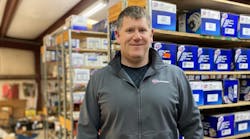There is likely to be a significant aftermarket aspect to the Department of Transportation's (DOT) expansion of the slow-moving Takata airbag inflator recall program.
The DOT's National Highway Traffic Safety Administration (NHTSA) announced in early June that is was considering issuing administrative orders leading to coordination of the Takata remedy program. Those orders could touch on "coordination as to airbag inflator sourcing, production, allocation, delivery, installation, and adequacy of the remedy."
For example, NHTSA is wondering whether, and how, it should order additional authorized repair facilities, or any other regulated entity, to aid Takata and/or manufacturers in the timely completion of remedy programs.
NHTSA is under increasing pressure from Congress to step it up on the Takata recall, which is at 34 million vehicles and counting. Relatively few of those vehicles have received replacement airbags, and some of those that have received the same Takata bags that have proven problematic.
A hearing on the Takata recall in the House Energy & Commerce Committee on June 2 was the scene of exasperated comments from both Republicans and Democrats on the committee. Mark Rosekind, administrator of NHTSA for only six months, was essentially treated with kid gloves with most of the unhappiness from the dais directed at the Rosekind's predecessors, who were in place when the first Takata airbag exploded in 2004.
Not only have a majority of recalled cars not been fixed, but Takata still does not know what caused the airbag explosions, at least not with any precision. Kevin Kennedy, executive vice president at Takata, told the hearing that ammonium nitrate, a propellant, was a factor in the explosions, which sent pieces of metal flying around the vehicle, in some cases impaling occupants and causing deaths. None of the 34 million recalled airbags contained a desiccant in combination with the ammonium nitrate. A desiccant is used to absorb humidity. Airbag explosions seem more likely in humid climates.
Kennedy went on to tell a surprised Rep. Michael Burgess (R-TX), chairman of the commerce, manufacturing and trade subcommittee, that Takata was not installing replacement air bags with ammonia nitrate propellant without a desiccant.
Rosekind seemed to allude to that problematic situation when he conceded that some car owners receiving replacement inflators are getting "interim" remedies instead of long-term solutions. "The dealer should make it clear to the customer which one of those the customer is getting," Rosekind said.
Questionable replacements or not, very few of the 34 million and counting (only seven of 11 automakers have reported to NHTSA on which of their cars are subject to the recall) vehicles have received replacements.
Allocation of replacement parts is at issue, as is sufficiency of repair facilities. NHTSA is apparently considering whether and how to order additional authorized repair facilities to aid Takata and the auto manufacturers.
Takata has taken a number of steps over the past few months to acknowledge its responsibility for the airbag explosions. First, in May, Takata signed a consent decree with NHTSA that allows the agency to do some things it couldn't previously do, such as expand the recall via administrative orders, which the agency is now considering.
One of the steps the agency is considering taking is collaborating with other Tier One and Two inflator suppliers, who may include ARC Automotive, Autoliv Americas, Key Safety Systems, Toyoda Gosei North America Corporation, TRW Automotive and Special Devices/Daicel Group "to craft solutions that further mitigate and control the risk of harm by ensuring safe airbags in every motor vehicle in the United States."
Then in late June, Kennedy appeared before a Senate committee and appeared to go further, and appear more contrite than he did in the House. "It is unacceptable to us for even one of our products to fail to perform as intended," Kennedy said. "We will do everything in our power to address the safety concerns raised by airbag ruptures."
Subscribe to Aftermarket Business World and receive articles like this every month….absolutely free. Click here.

